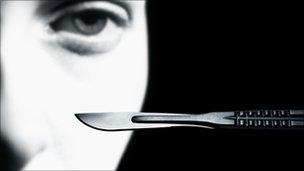Cosmetic surgery industry in UK 'has key weaknesses'
- Published

Nearly half of people say they would have cosmetic surgery
There are fundamental weaknesses in the way cosmetic surgery is carried out in the UK, an official review body says.
The National Confidential Enquiry into Patient Outcome and Death found many centres were failing to assess and care for patients properly.
In particular, the poll of 361 sites found patients were at risk from a culture which saw teams "have a go" at operations they rarely performed.
The professional body for cosmetic surgeons accepted there was a problem.
The British Association of Aesthetic Plastic Surgeons only has about a third of the industry as members.
President Nigel Mercer said: "This presents a distressing picture, but one which is sadly not surprising. Aesthetic surgery needs to be recognised as the multi-million pound specialty it is."
Rising
The National Confidential Enquiry said closer and tougher regulation was the answer, pointing out that half of the sites it had contacted had failed to answer its questions - despite rules saying they should.
The researchers from the government-funded safety watchdog looked at all sites that offered cosmetic surgery privately, including some NHS hospitals that have private wings.
There are now about 100,000 cosmetic operations carried out each year - a figure which is rising - with breast enlargements by far the most common.
The researchers found that psychological evaluation was carried out only in slightly more than a third of centres they assessed.
The two-stage consent process, which is recommended to allow patients time to reflect on the treatment, was not performed at 32% of sites.
More than half of the operating theatres were not properly equipped and a fifth had no emergency readmission policy, while monitoring before and after treatment was not sufficient, the researchers said.
But the authors saved some of their strongest criticisms for the inexperience of some of the teams.
They said with the exception of breast enlargement operations, the majority of sites were not carrying out enough procedures to keep their skills up.
It is accepted that sites should be carrying out more than 20 operations a year to give them enough experience.
But only one in 10 managed this for ear-pinning, a fifth for breast reductions and a quarter for facelifts. The worst offenders were not named.
Cosmetic surgery patient Denise Wood talks about the problems she experienced
Report author Dr Alex Goodwin said: "Cosmetic surgery is far too dispersed with too many teams prepared to 'have a go' at procedures that they rarely perform. And failures in monitoring patients after surgery are a recipe for disaster."
The Department of Health said the findings cast a "long shadow" over the industry and it expected tougher regulation in the future.
In October, a new system is being introduced in England which will cover the cosmetic surgery industry. It will allow the Care Quality Commission (CQC) to fine and prosecute the worst offenders.
Amanda Sherlock, CQC's director operations said: "It is unacceptable that some cosmetic surgery providers don't have the basic standards of good medical practice in place."
Peter Walsh, chief executive of Action against Medical Accidents, said the "shabby treatment" was putting lives at risk.
- Published13 September 2010